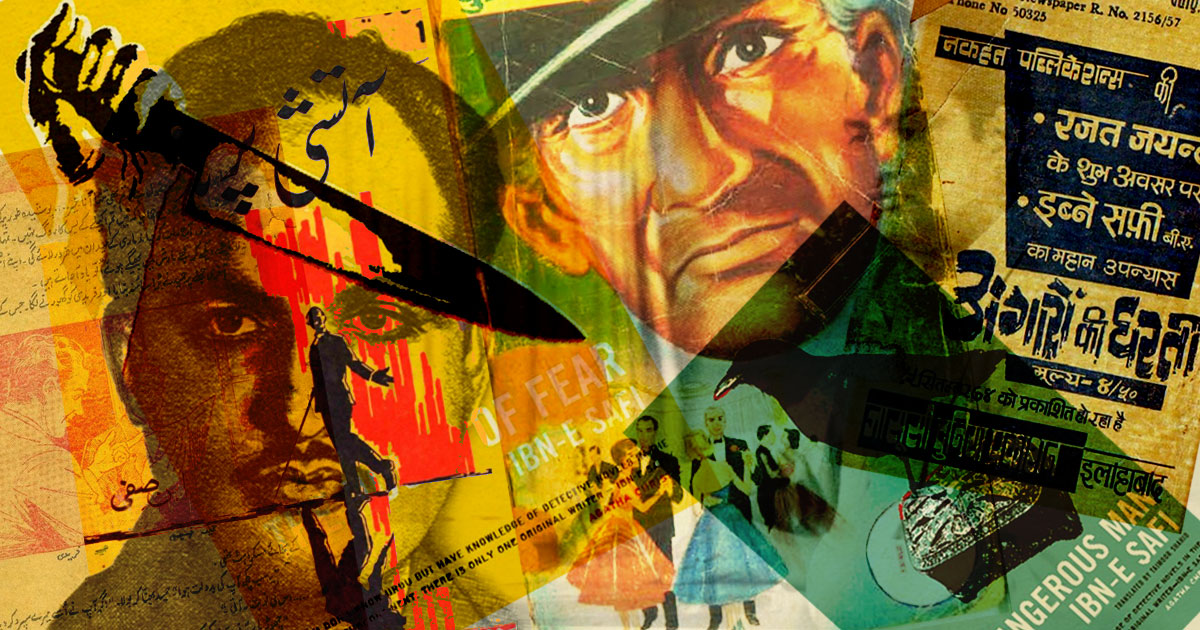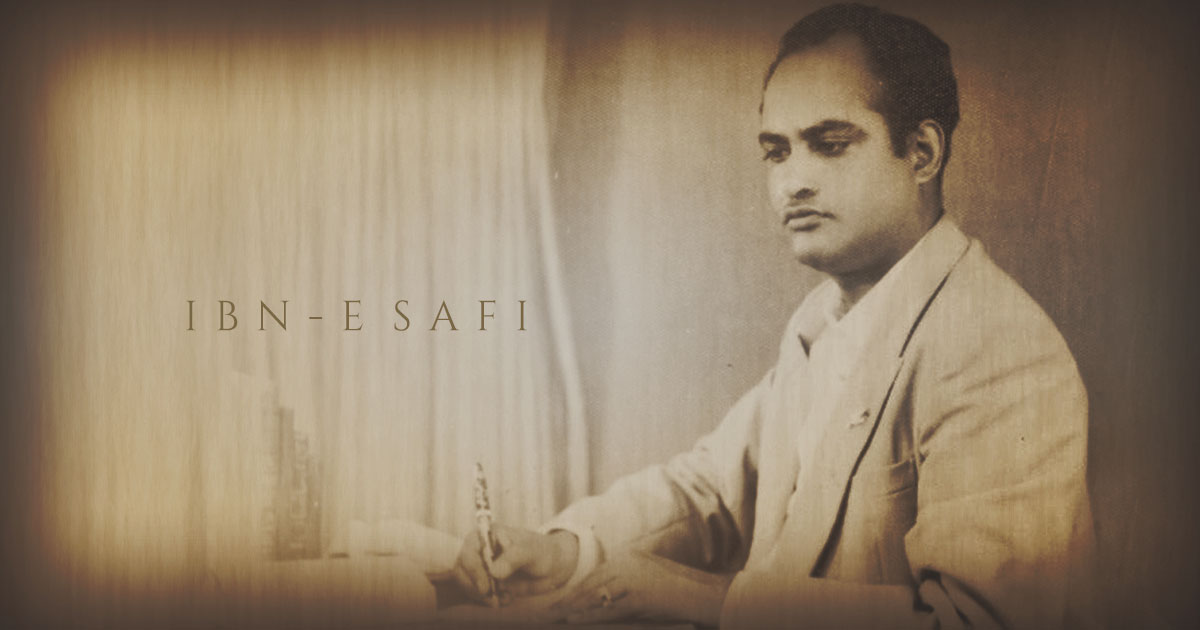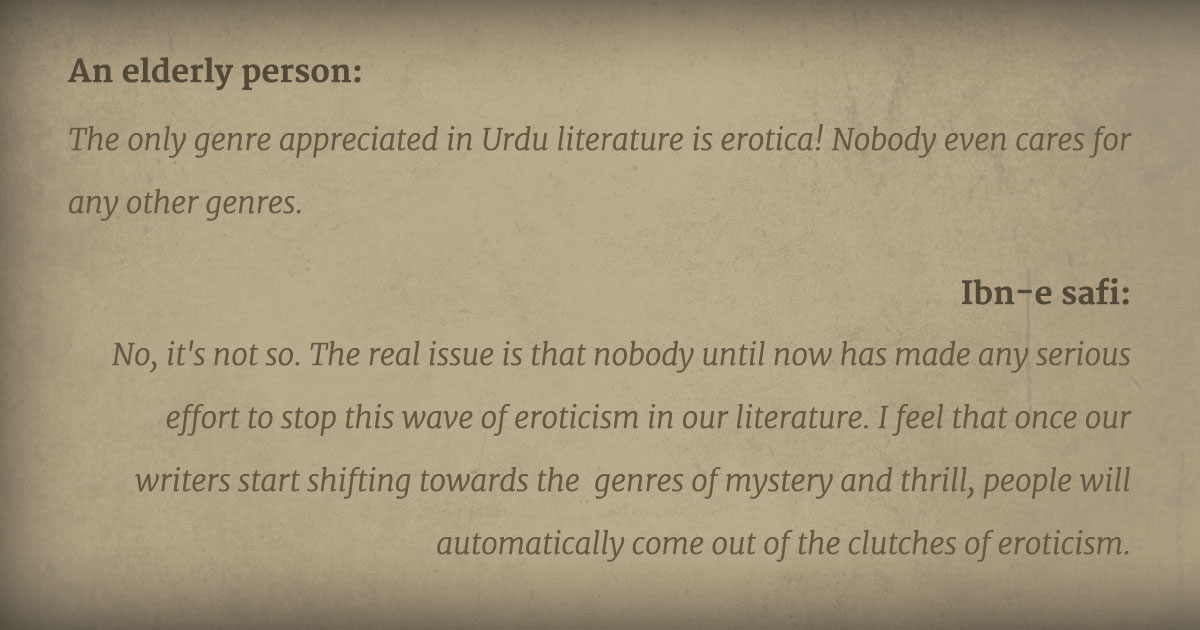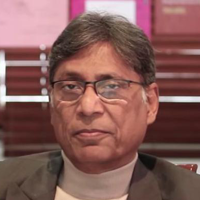
Ibn-e Safi : The Uncrowned Emperor of Detective Fiction
When it comes to detective fiction in Urdu, it wouldn’t be wrong to think of Ibn-e-Safi as its synonym.
Before Ibn-e-Safi, the books written in the name of detective fiction were only excuses in the name of the genre. They were works of fiction that titillated imagination as they were either sensual in nature or translations of some western best-sellers of romantic fiction. Safi’s fictions were woven around mysteries, puzzles, and a host of crime-solving methods in such an intriguing manner that once the reader started reading, he would leave it only when the story reached its end.

Ibn-e Safi’s first novel—Diler Mujrim– was published in 1952. After that, he regularly wrote one novel every month. His writing career spanned over almost thirty years. During this period, he wrote more than two hundred novels and every novel proved a best-seller and was translated into different languages of India.
Agatha Christie once describe him as “the only original writer in subcontinent”.
Born in year 1928, at a place called Nara in the Allahabad district of Uttar Pradesh, Ibn-e-Safi’s real name was Asrar Ahmed. In his early years, he used to write poetry under the name of Asrar Narwi. He completed his primary education at Allahabad and graduated subsequently from Agra University. It was during his college days that he met Abbas Hussaini, the owner of Nikhat Publications. Hussaini made a great impact on the personality of Ibn-e-Safi and this was Hussaini who played a major part toward his initiation into a literary career. Safi started editing the poetry section for Hussaini’s magazine and also began writing humorous and satirical essays with very fascinating headings.
The literary conversations between Ibn-e-Safi and some of his friends took an interesting turn when Safi got the idea of developing detective plots and turning them into fictional works that could cause great curiosity among the readers. This happened to lay the foundation of the detective fiction writing in Urdu and the emergence of its greatest practitioner in Ibn-e-Safi. Here is an interesting narrative in this regard.

This conversation took place in the closing months of the year 1951. After this, Ibn-e Safi took it upon himself to fight against this growing wave of eroticism in Urdu literature. In his first novel, he developed two characters by the name of Faridi and Hameed, who later became the most muscular and the most intriguing characters in Urdu fiction. Ibn-e-Safi continued to publish and tell the world the tales of their action-packed adventures for almost three decades.
When Ibn-e Safi’s father migrated to Pakistan following the Partition of India, Ibn-e-Safi also followed him in 1952. There, he created another everlasting character of Imran. This was another feather in an already decorated hat that he wore which imparted yet another variety to his great detective stories and unveiled a new facet of his immensely creative mind. Even though Ibn-e Safi lived and wrote in Pakistan, his novels were simultaneously published in India, as if confirming his overpowering presence all over.
Ibn-e-Safi wrote one novel every month without fail as his novels had become an obsession with his readers. This pressure of writing and that too with such compulsive regularity took a heavy toll on his health. He was diagnosed with Schizophrenia due to which he was unable to write for three years between 1961 and 1963. The absence of Safi from the scene during this period led to a proliferation of fake writers none of whom could meet his standard and hold the attention of his readers. Safi’s copyists failed miserably as they neither had the gripping stories of the Ibn-e Safi kind, nor the language, wit, or treatment that distinguished him.
When Ibn-e Safi recuperated and resumed writing three years later in November 1963, he made an amazing comeback with DeDh Matwaale. This novel was launched in India by none other than Lal Bahadur Shastri, who himself was an avid fan of Ibn-e-Safi’s fiction.
Ibn-e-Safi’s ingenious method of solving crimes and his clever ways of catching the culprit not only enthralled his readers but reached a new height when Pakistan’s high command invited him a number of times to train the country’s detective agencies. Even the head of state, Ayyub Khan, was an admirer of Ibn-e-Safi’s work and made sure that his novels found their respectable place at his bookshelves.
The year 1979 brought another shocker. Ibn-e-Safi fell ill again. This time he was diagnosed with cancer. On Saturday July 26, 1980 he died fighting this terminal illness. It is almost four decades since he left the world but even today he remains at the top as a detective fiction writer in Urdu. His works have been translated into English, apart from several Indian languages. Ibn-e Safi’s aura stays back. Many of his admirers go back to his works, taking them out of their well-guarded boxes, or dearly preserved libraries. They enjoy each turn of phrase and each shot of wit as his characters act and interact ingeniously to solve mysteries.
NEWSLETTER
Enter your email address to follow this blog and receive notification of new posts.





